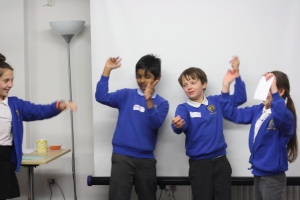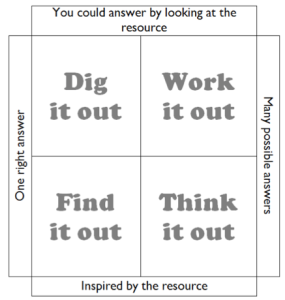The Gender Respect project was involved for the third year in CRESST’s annual Peer Mediators’ Conference with ten Sheffield primary schools. For a short film of the conference click on the image.
Helen and Heather ran three 50-minute workshops for all the children with the aims of
- exploring what it’s like to be a boy or girl in South Yorkshire in 2017
- looking at the attitudes and assumptions people have about boys and girls;
- considering how these thoughts may affect their peer mediation work
The children engaged readily in discussion about gender equality and their comments were very similar to previous years and to the Scoping Study carried out by the Gender Respect project in 2013.
When asked at the beginning whether there were any issues in their schools relating to gender, every group identified a problem with girls being excluded by boys from football with general agreement from many of the children including the boys: ‘Boys are reckless and don’t pass to girls’. Yet when we discussed this further most of the children told us that girls could be just as good as boys at football and it was only because ‘boys play football more’ that they ‘can be better’. With one group we had a lively agree / disagree line from a statement by one of the children that ‘professional football should have mixed teams’. Children stood along the line presenting strong arguments at either end for why this would advantage or disadvantage women. None of the children suggested that it would ruin the game or spoil it for men.
The discussion about jobs and occupations prompted by some photographs of people in non-stereotypical roles prompted surprise from many of the children particularly at female builders and pilots and men involved in childcare. Most of the children said that they hadn’t seen women builders or pilots:
‘When you think of a pilot you think it would be a man, and staff are women.’
‘You don’t see girls playing with planes and pretending to be a pilot.’
‘Really excited when I saw a female pilot on board, as it made me feel like I could do anything.’
Since a number of the children were doubtful whether men were capable of childcare we had another agree / disagree line with the statement:
‘Men are not good enough to take care of babies’
| Agree | Disagree | |
| Don’t put enough work in | There’s nothing wrong but they need to know they can | Dad looks after baby sister |
| Women want to | Men can’t deal with it as well | They can learn to look after their babies |
The children’s wishes at the end of the session displayed a heartfelt belief that there should be equality:
‘I wish that boys and girls all believed they can do anything they want, e.g., girl – football, or boy – ballerina.’
‘I think that boys should pass in football and understand that girls are equal to boys.’
‘I wish that girls and boys would get along together, work together and play together. I wish they could share and play together. I would help them share.’
‘I wish that girls and women would be expected to do as much or as little as boys and men. For example, in football games, rock-climbing, dancing, being pilots and many more, and get paid equally for the quality of their work. For example, a male footballer who plays for Sheffield and scores three goals every game should be paid as much as a woman footballer who plays for Sheffield and scores three goals every game. And the same with boys doing things you normally see the girls doing.’
Although in order to explore gender inequality we had to identify perceived differences between girls and boys some of the children were aware of the problem of naming girls and boys as separate and opposite in the language they used in their wishes:
‘Whatever gender you are, you can do everything.’
‘Any person can do any job or play any role regardless of their gender.’












